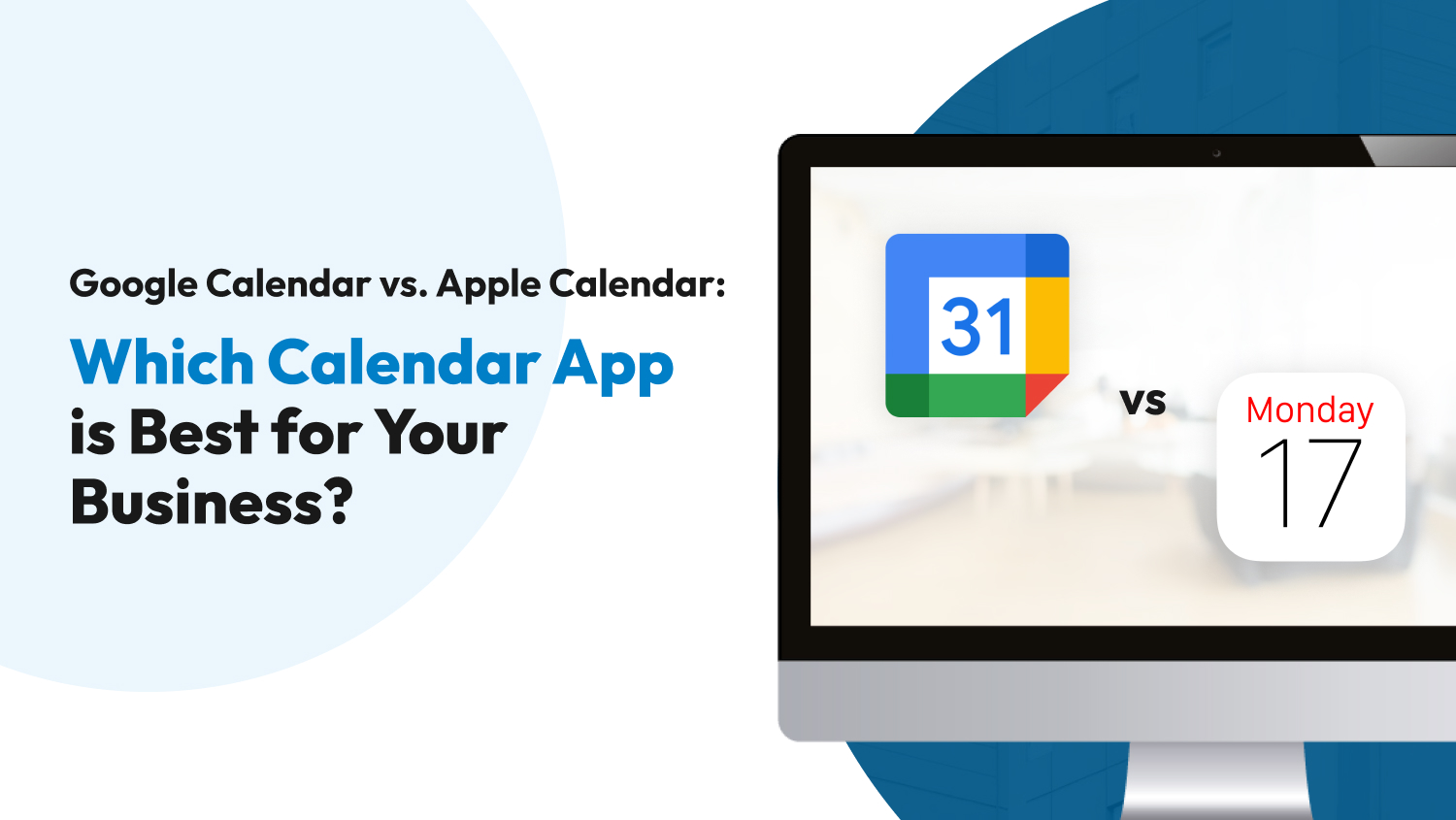Business
Google Calendar vs. Apple Calendar: Which Calendar App is Best for Your Business?
Time is man’s most valuable resource, and we always need more of it in today’s fast-paced world. Therefore, every business’s time must be managed, cataloged, and spent wisely.
That’s why calendar applications are indispensable in our tech-driven landscape. For business owners, calendar apps are essential to scheduling appointments, creating or meeting deadlines, and ensuring seamless coordination with teams. Moreover, it helps you track other events in your life so personal, and business matters don’t overlap.
Both Google and Apple have their calendar software. So, let’s put them under a microscope and see which one is better for your business.
Google Calendar vs. Apple Calendar: A Business Decision
Calendars are straightforward, so there’s little that separates calendar platforms. So, we must give Google Calendar and Apple Calendar a thorough comparison using these benchmarks:
- Accessibility and Usability
- Event Management
- Notifications
- Schedule and Calendar Sharing
- Third-Party Integrations
- Data Security
- Miscellaneous Features
Accessibility and Usability
Often, we overlook certain software features. For instance, we rarely notice when a platform is easy to use, but clunky interfaces will almost certainly turn us off. That’s why it’s crucial for software to be usable and accessible.
Google Calendar and Apple Calendar have similar interfaces, offering color customization. However, the former takes this further by providing personalization options for:
- Calendar Density
- Feature Enable and Disable
- Time Zone Customization
You can also switch time zones in Apple Calendar, but you must change your entire iCloud settings.
As for viewing, Apple Calendar shows you the day, week, and month on a horizontal view only. Google Calendar makes this feature available no matter the screen orientation. But for mobile phones, it looks clunky and cluttered.
Lastly, Google Calendar is accessible on all platforms, including iOS and macOS. You can’t get Apple Calendar on Android devices—but it offers many quality-of-life services on Apple devices, such as seamless Apple app coordination and Siri integration.
Our Choice: Since Google Calendar is more accessible and customizable, it gets the point here (1-0) despite Apple Calendar’s simplicity.

Event Management
When picking a calendar application for your business, it’s also important to consider how well it manages your important events.
Creating a new event on Apple Calendar is simple. After pressing the “+” button, you’re prompted to input the following:
- Important links
- Location
- Notification
- People
- Tags
- Time
- Title
Google Calendar values flexibility over simplicity. When you press their “+” button, you’ll first be prompted to select which of the following you’re making:
When creating an event in Google Calendar, you can customize it by inputting information similar to Apple. However, besides what Apple offers, Google also has a built-in invitation feature for event creation, allowing you to add the event to other people’s Google Calendars.
Our Choice: Google Calendar gets another point (2-0) for its robust event creation options.
Notifications
Another critical aspect of calendar software is how well it can notify you of events you might otherwise forget. Fortunately, you can’t go wrong with either platform.
Both Google Calendar and Apple Calendar have extensive options for notifications. They also offer a default notification that applies a specific setting to all events. This includes setting alarms minutes or hours before events and alert persistence.
However, Apple Calendar separates itself from the pack due to its “Time To Leave“ feature, which uses sourced data to tell you the optimal time to head to your location with traffic and weather conditions in mind.
Our Choice: Apple secures its first point (2-1) with a fantastic alert feature.
Schedule and Calendar Sharing
For your calendar software to be effective, it must also have a feature that allows you to share your schedule with friends, families, and co-workers. Apple Calendar and Google Calendar both offer calendar sharing but Google Calendar is the superior choice because of two reasons.
First, Google is more inclusive even to those without Google Calendar, as they allow sharing schedules with people using other calendar tools. The second reason is that Apple Calendar only allows sharing calendars or invites with people saved in your contacts. This is more limiting, especially in countries that lean towards Android and Windows over iOS and macOS.
Our Choice: It’s a no-brainer. Google Calendar (3-1) wins this round over Apple Calendar.
Third-Party Integration
Since you’re picking calendar software for business, it must integrate with other applications your team already uses.
Let’s start with Apple. As mentioned, Apple Calendar can seamlessly connect with other Apple applications, including iCloud. The problem is that it only offers a little else regarding integrations.
On the other hand, Google Calendar can integrate with Zapier, a tool that connects to over 5,000 apps. Aside from that, Google Calendar can also be integrated using these methods:
- As an API
- Direct file import
- Events from other applications
- Links
Our Choice: The lead gets wider as Google snags another point (4-1).
Data Security
In today’s digital landscape, virtual security is almost as important as physical security. To avoid invasion of privacy, your calendar software must be well-protected from intruders.
For Google Calendar and Apple Calendar, here’s a rundown of their similar security features:
- Data Deletion: Whenever you feel your data is vulnerable, you can quickly delete it with one button.
- Encryption: Both apps offer tight encryption even when information is in transit. Google calls this feature “End-To-Use,” while Apple uses “End-To-End.”
- Location: For both calendars, location services are prompted, not automatic.
- Reports: Both Google and Apple offer an analysis of your virtual security. This is called “Privacy Checkup” for Google and “App Privacy Report” for Apple.
- Two-Factor Authentication: Two forms of identification are required to access your accounts. These are your password and SMS confirmation.
Google Calendar also offers more security customization, such as only allowing features for specific activities or events.
However, it’s also worth mentioning that Google Calendar came under fire in 2019 for being a security risk. In a report published in Forbes, it’s said that data in Google Calendar was so accessible that one click could expose your entire schedule and other vulnerable information to the world.
Our Choice: Despite the 2019 report, both tools are secure enough today. However, Apple’s security (4-2) is proven to be more robust against third-party attacks.
Other Features
There are also other features that we can’t categorize that should help you decide which one you should pick for your business. These are:
- Apple Calendar can be synced with FaceTime, while Google Calendar can do the same with Google Meet. For businesses, Google Meet is more valuable.
- Syncing events on Apple Calendar needs both applications. Google Calendar to Apple Calendar only requires the latter.
- You can add multiple time zones in Google, which makes for more streamlined international calls.
Our Choice: Our last point goes to Google Calendar (5-2).

Which Should You Pick?
The results are in, and Google Calendar wins by a hair at 4-3. The good news for Apple fans is that these calendar applications have their specialty, making each tool worth picking. So when should you choose Google or Apple Calendar?
Apple Calendar is best when your business runs exclusively on an Apple ecosystem. You can seamlessly integrate it with other Apple apps, creating a more streamlined workflow. Moreover, the “Time To Leave” feature is an excellent addition, especially for people who don’t want to be late for their appointments. Apple Calendar is also more secure than Google Calendar.
On the other hand, Google Calendar is perfect for those who value flexibility. You can easily integrate it with other Google applications and thousands of other third-party software using Zapier. Creating events in Google Calendar is more complex but offers more options for personalization. It’s also significantly easier to share events and calendars with your teammates using this tool.
Like most things, choosing the optimal calendar app for your business is subjective. Only you can make that decision, but we recommend you always consider the pros and cons mentioned in this article.
For more tips on how to better manage your time, you can also check out our article on time blocking. Good luck!











